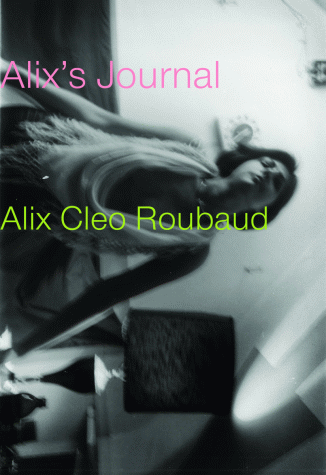 Alix Cleo Roubaud was born in 1952. A talented photographer not well known during her lifetime, Alix was what one could call a tortured soul. She was often depressed, suicidal, and an abuser of prescription drugs and alcohol. She died of a pulmonary embolism at age 31 having also suffered from severe asthma. This may sound like the setup to a French art film, but in fact it is a very true story. Alix left behind not only her brilliant photography work, but her journals as well. The recently translated Alix’s Journal gives an English speaking audience a very personal look at the life and death of this talented artist.
Alix Cleo Roubaud was born in 1952. A talented photographer not well known during her lifetime, Alix was what one could call a tortured soul. She was often depressed, suicidal, and an abuser of prescription drugs and alcohol. She died of a pulmonary embolism at age 31 having also suffered from severe asthma. This may sound like the setup to a French art film, but in fact it is a very true story. Alix left behind not only her brilliant photography work, but her journals as well. The recently translated Alix’s Journal gives an English speaking audience a very personal look at the life and death of this talented artist.
In her will, Alix left the journals to her husband, revered writer Jacques Roubaud. He was not allowed to read the journals until after her passing. But he knew they were written with the intent of publication after her death, which she seemed to understand would most likely come all too soon.
Alix Cleo Roubaud’s style of writing is at first complicated, difficult to decipher. But it only takes a couple of pages to latch onto her dreamlike flow, her own unique usage of punctuation, and the depth of her soul and intelligence.
And no doubt Alix’s intelligence was part of what haunted her. Reflected in her photography which is also shared in this book, her depression left her somewhat of a hermit, finding little solace except through the numbing effects of alcohol, cigarettes, and pills. Within the book, Alix’s photography shows her alone, occasionally with her husband, but always indoors - usually an apartment, a bedroom, a simple hotel room. Lonely settings all, but what shows through time and again as a true support through her loneliness was her love for her husband, who she often wrote to directly in her journal, as if she fully understood he’d read her words when she no longer was.
Alix’s Journal was originally written in a mixture of French and English, her two native tngues, having grown up speaking both interchangeably. In this publication by Dalkey Archive Press, Alix’s words are translated into English by Jan Steyn. A beautifully melancholy work, Alex’s Journal ends as only fiction is expected to do, but as only true life can manage.
